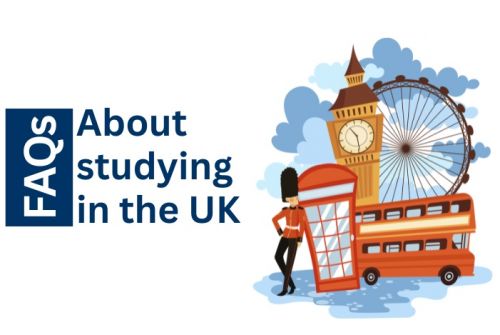
FAQs about studying in the UK

With its outstanding universities, diverse culture, and excellent academic reputation, the UK continues to be one of the sought-after locations for international students. You undoubtedly have queries concerning the procedure, student life, and what to anticipate if you are thinking of studying in the UK. To help you be ready, here is the list of the frequently asked questions (FAQs).
Some of the best universities in the world such as Imperial College London, University of Cambridge, and University of Oxford are located in the United Kingdom. It provides outstanding tuition, shorter course lengths (the majority of undergraduate degrees last three years), and chances to hone research and critical thinking abilities. Additionally, the UK offers a rich cultural atmosphere that is ideal for exploration and education.
The qualifications for admission differ based on the course of study and university. Usually, you will require:
If you have completed past English-language courses or meet certain standards, such as having strong English test results from prior coursework, many colleges provide IELTS exemptions. For further information, you can always visit Bizz Education. Bizz will surely help you with your queries and selecting the university that best suits you.
The cost of tuition varies per university and subject. Generally:
International students with student visas are permitted to work full-time during the vacations and up to 20 hours per week during the academic year. Professions in retail, hospitality, or on campus are common. Make sure your academics aren't hampered by your work.
After completing their studies, international students can remain in the UK for two years (or three years for PhD graduates) under the Graduate Route. For obtaining work experience or seeking employment in the UK, this visa is suitable.
The UK provides a welcoming and multicultural environment. You will be able to:
If you are a postgraduate studying for a Masters in Research, you may bring dependents (spouse or children) to the UK on a dependent visa. They may live and work in the United Kingdom while pursuing their degrees. However, undergraduate and regular postgraduate degrees cannot bring their family along.
International students must pay the Immigration Health Surcharge (IHS) when applying for a visa. This grants you access to the National Health Service (NHS) for medical treatment during your stay.
You can consider lots of choices, including:
The UK's strong economy and worldwide connections provide tremendous professional opportunities.
Studying in the UK is a life-changing experience that provides both academic achievement and cultural enrichment. Proper preparation and awareness of the procedure will help your journey go more smoothly. If you have any more queries, contact your university's international office for assistance.
Are you ready to begin your UK education journey? Let this guide be your first step!